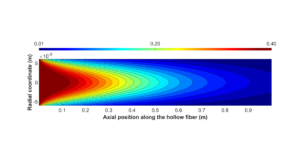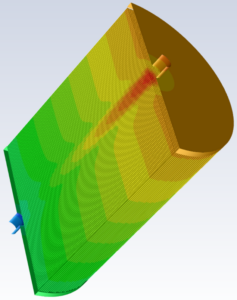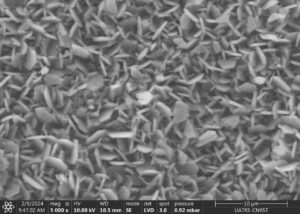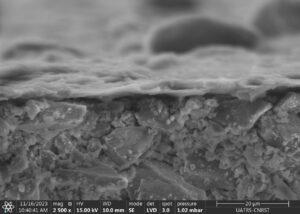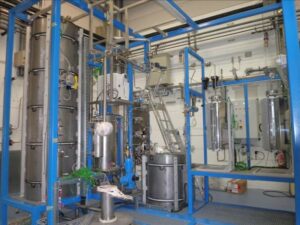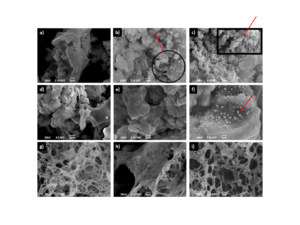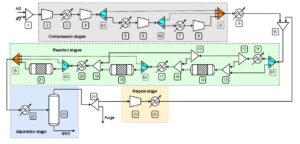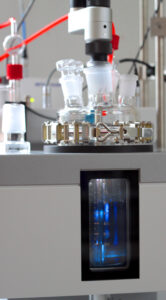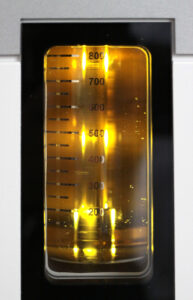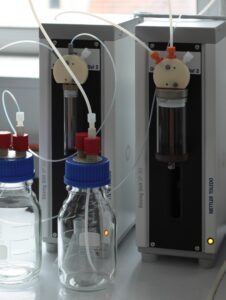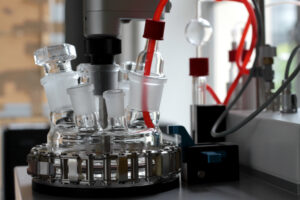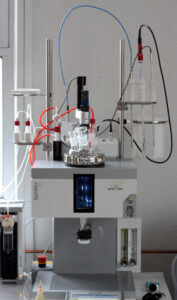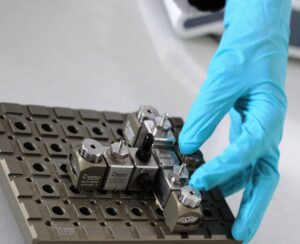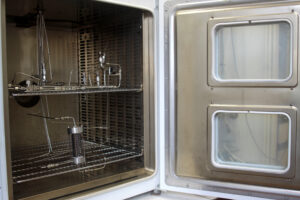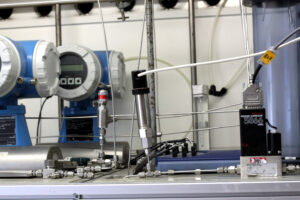PRIMO
Processes, Reactors, Intensification, Membranes, Optimization
The challenge of climate change, and the fact that many raw materials are reaching their global limits, calls for an energy transition that will require us to adapt, or even reconsider, many material and energy transformation processes. The management of freshwater resources, carbon capture and utilization, and improving the energy efficiency of processes are particularly at the heart of the industry's current concerns. These major areas of study occupy a central place in the research carried out within the PRIMO axis.
The axis is structured into two teams, STREAM (separations, transfers, reactions, energy and matter) and PRISME (processes, reactors, intensification, process synthesis, membranes). The teams' scientific activity can be subdivided into three themes. The first two group together the families of processes mainly studied within the axis: membrane processes and fluid-solid catalytic processes. The third theme covers methodological development activities in the field of process intensification and synthesis. These methodologies are mainly, but not exclusively, applied to membrane and catalytic processes.
The scientific approach developed is multi-scale, ranging from the molecular scale to that of the process as a whole. Theoretical, numerical and experimental studies are closely combined. The scientific objective is to gain a deeper understanding of the various phenomena involved and their possible interactions, in order to optimize process design and operation. The phenomena considered are: hydrodynamics of single- and multi-phase flows, chemical reactions, thermodynamic equilibria, material and heat transfer.
Modeling and simulating the spatio-temporal evolution of physical quantities requires the development of dedicated calculation tools. In addition to the creation of calculation codes using technical languages such as Matlab and Python, many studies are carried out using commercial software adapted to the problem and scale under study: Comsol and Fluent for fine modeling of operations using numerical fluid mechanics, Aspen Hysys, ProII and ProSimPlus for process simulation, coupled with Midaco for computer-aided process synthesis. The PRIMO axis also boasts dedicated measurement and analysis equipment, as well as a range of pilot plants, enabling experimental studies to be carried out on a variety of scales.
Highlights include the renewal of two joint laboratories, MELUSINE with EDF, which focuses on liquid effluent treatment, and PIGAZ with Air Liquide, which focuses on industrial gas production and treatment. Ongoing national projects include the PEPR IMOSYCCA project on CO2 capture using membrane contactors, and the ANR ISARD project on the intensification of dynamic NH3 synthesis. The team is also involved in the European M2ARE project, studying the synthesis of methanol from biogenic CO2 for maritime transport. Finally, the development of calculation codes dedicated to membrane processes has led to the creation of the start-up, MEMSIC.
Membrane processes
Membrane processes are mixture separation processes involving the use of a polymeric or inorganic film, which may be dense or microporous, the membrane. Depending on the characteristics of the membrane, single-phase mixtures (gas or liquid) or two-phase mixtures (liquid-solid) can be separated. For the separation of single-phase mixtures, membrane processes are an alternative to conventional molecular separation processes. Their main advantages are low energy consumption, compared with distillation, and ease of implementation, compared with adsorption. Thanks to their intrinsic qualities, membrane processes are enjoying strong growth, and their use in industrial environments is constantly increasing.
Different membrane processes can be distinguished, depending on the size of the components to be separated, the physical nature of the driving force used to overcome the membrane barrier, and the physical state of the fluids circulating on either side of the membrane. Various membrane processes are studied within the PRIMO axis. The following non-exhaustive list provides an overview.
- Gas permeation for industrial gas separation in general and CO2 capture in particular.
- Gas-liquid membrane contactors for CO2 capture and the degassing and desolvation of industrial effluents.
- Liquid-liquid membrane contactors for the purification of phenolic compounds from bio-oils.
- Nanofiltration for the selective recovery of dyes in the treatment of liquid effluents from the textile industry.
- Reverse osmosis for effluent treatment in the nuclear industry.
- Membrane distillation for desalination of brackish water.
The aim of PRIMO research is to develop new membrane processes or to intensify existing ones. This involves modeling the phenomena involved at all scales, from molecular mechanisms, through hydrodynamics and transfers, right up to the architecture of the entire process. Multifunctional and hybrid processes are also envisaged.
Skills
- Design, synthesis and characterization of polymer membranes
- Characterizing the transfer properties of polymeric and inorganic membranes
- Modelling of gas permeation, reverse osmosis and membrane distillation processes
- Computational fluid dynamics (CFD) for advanced modeling of membrane processes
- Gas-liquid and liquid-liquid membrane contactors
- Architecture des procédés membranaires
- Procédés multifonctionnels et hybrides impliquant des séparations membranaires.
Equipments
- Magnetic suspension microbalance for measuring CO2 sorption coefficients on various materials.
- Time-lag facility for measuring solubility and diffusivity within different membrane materials.
- Gas permeation pilot plants for testing polymeric and inorganic membranes.
- CO2 capture pilot plants using membrane contactors.
- Nanofiltration pilot plant.
Gas-solid and liquid-solid catalytic processes
Heterogeneous fluid-solid catalysis processes account for the majority of reactive processes in industry, and mastering them is fundamental to the successful transition to sustainable industry. The development of new processes using a multi-scale approach is a thematic priority for the PRIMO axis, especially key processes in the energy transition, such as those based on hydrogen and CO2 recovery. Applications include the use of hydrogen for mobility, micro-cogeneration or e-fuels production (Power-to-Chemicals), and the separation and recovery of CO2 as part of a circular engineering approach. Many challenges need to be met to develop these new processes: reducing their spatial and environmental footprint, increasing the modularity of equipment, the need for decentralized production and managing the intermittent nature of incoming material and energy flows.
From a methodological point of view, the work carried out on the catalyst scale consists, on the one hand, in developing kinetic models based on experimental results that can be used on larger scales, and, on the other hand, in synthesizing and characterizing these catalytic materials, in partnership with other areas of the LRGP, or even with other laboratories. As part of this project, a pilot plant to test the performance and stability of catalytic materials will be built at LRGP in 2023-2024. Reactor modeling and optimization work at equipment scale integrates kinetic, thermodynamic and hydrodynamic phenomena, as well as material and heat transfer. These models are integrated into complete process models, in order to calculate global performance indicators (production cost, energy efficiency, environmental impact, etc.) and subsequently identify the optimum process architecture, i.e. the one that minimizes/maximizes these indicators.
Skills
- Catalytic process simulation and optimization (CAD).
- Establishment of models and identification of kinetic parameters.
- Modeling and optimization of fluid-solid catalytic reactors.
- Computational fluid dynamics (CFD) for advanced catalytic reactor modeling.
- Synthesis and characterization of catalytic materials.
Equipments
- Pilot plant for measuring the performance and stability of catalytic materials.
- Calorimeter.
Process intensification and synthesis
Intensification, defined as all the technologies and methods used to increase volume productivity, and process synthesis, seen as the optimal arrangement of unit operations, are part of the scientific methodologies of the axis. They are aimed at designing new equipment and innovative processes with a view to optimizing technical and energy efficiency.
The main intensification strategies developed within the axis are as follows.
- Geometric structuring and miniaturization of transfer and reaction equipment.
- Transition from batch to continuous processes.
- Design of multifunctional equipment, such as compact reactor-exchangers or reactor-separators, to take advantage of potential synergies.
Process synthesis is an important scientific theme of the PRIMO axis and of interest to the LRGP as a whole, given the many possible applications. On the one hand, work is carried out to determine the optimal architecture and operating conditions of a process by optimizing superstructures on the basis of performance indicators. Secondly, evolutionary methods are being developed to identify ab initio process structures. In order to limit the computation time of optimization algorithms, approaches using machine learning and graph methods are employed.
Skills
- Intensification methodologies for data acquisition and industrial production.
- Intensibility analysis of reactors and processes.
- Computational fluid dynamics (CFD) for advanced modeling of single- and multiphase systems.
- Structuring and optimizing single- or multi-functional equipment.
- Intensification of chemical transfer operations.
- Process design using superstructure optimization or evolutionary methods.
Equipments
- Bench for thermal-hydraulic characterization of reactors and heat exchangers.
- Pilot plant for the study of structured evaporators.
Members
Omar ALJASEM ALHMIEDY, Doctorant
Danielle BARTH, Professeur Emérite
Bouchra BELAISSAOUI, Maître de Conférences
Faicel BELGACEM, Doctorant
Francisco Eduardo BOLANOS GARCIA, Doctorant
Christophe CASTEL, Professeur des universités
Laetitia CESARI, Maître de Conférences
Zakarya CHAFIQ ELIDRISSI, Doctorant
Jean-Marc COMMENGE, Professeur des universités
Jean-Pierre CORRIOU, Professeur Emérite
Felipe CORTES JARAMILLO, Doctorant
Paul DE JOANNIS DE VERCLOS, Doctorant
Clément DUVAL, Doctorant
Laurent FALK, Directeur de recherche CNRS
Eric FAVRE, Professeur des universités
Ghislain GENIN, Maître de Conférences
Emilien GIROT, Assistant ingénieur
Cristhian Andres GOMEZ CORONEL, Doctorant
Fulan HAO, Doctorant
Darrick LazzarusAnak HILLABY, Doctorant
Rainier HREIZ, Maître de Conférences
Vishnu KARAVADI, Doctorant
Muhammad Zul KEFAL, Doctorant
Margarita KUZNETSOVA, Chercheur
Mathilde LAFONT, Doctorant
Yakoub LAIDANI, Doctorant
Louise LE BRUN, Doctorant
Michaël MATLOSZ, Professeur des universités
Audrey MICHAUD, Doctorant
Madi MOUSSA, CDD - Ingénieur d'études (catégorie A)
Alexandra PERE-GIGANTE, Maître de Conférences
Andres David PINA MARTINEZ, Maître de Conférences
Jean-François PORTHA, Maître de Conférences
Bon Aventure Armand RAMAMONJISOA, Doctorant
Antonio ROCHA AZEVEDO, Doctorant
Sabine RODE, Professeur des universités
Zahia SARNI, Doctorant
Eric SCHAER, Professeur des universités
Hervé SIMONAIRE, Technicien
Abas WOUPNDOUNOU, CDD - Ingénieur d'études (catégorie A)
Di WU, Doctorant
